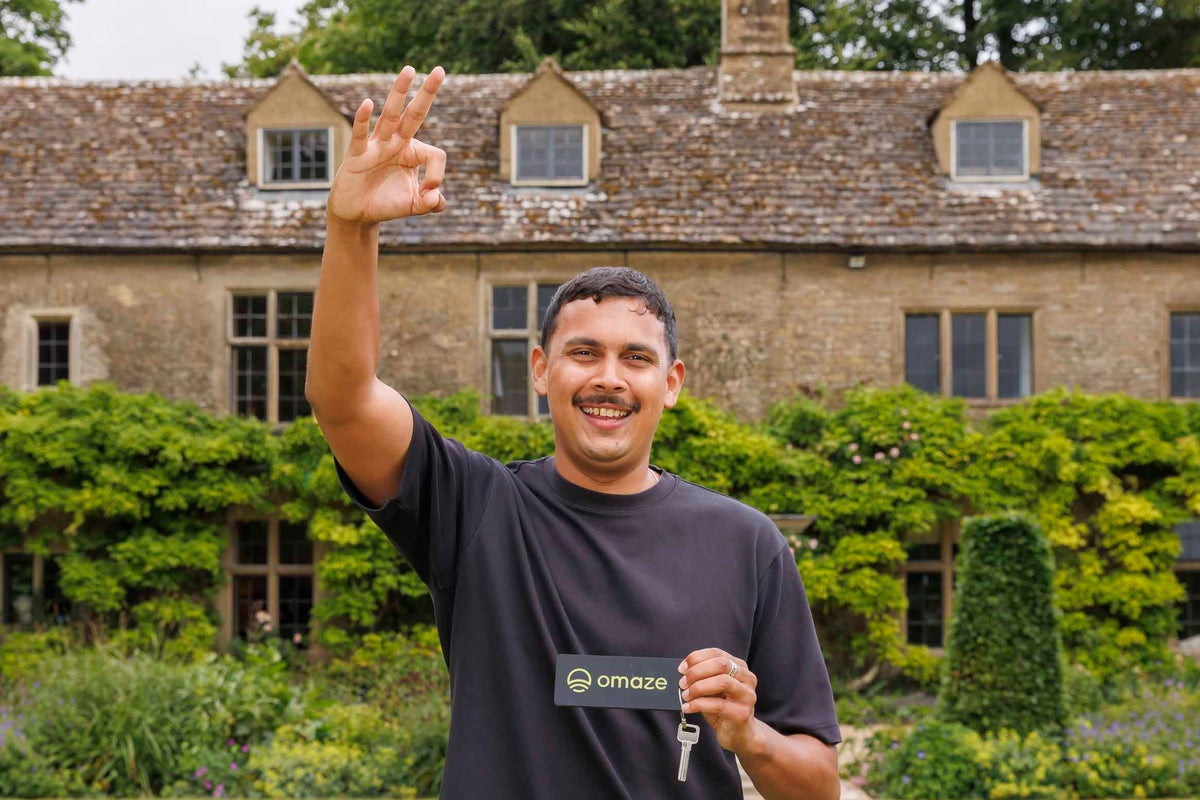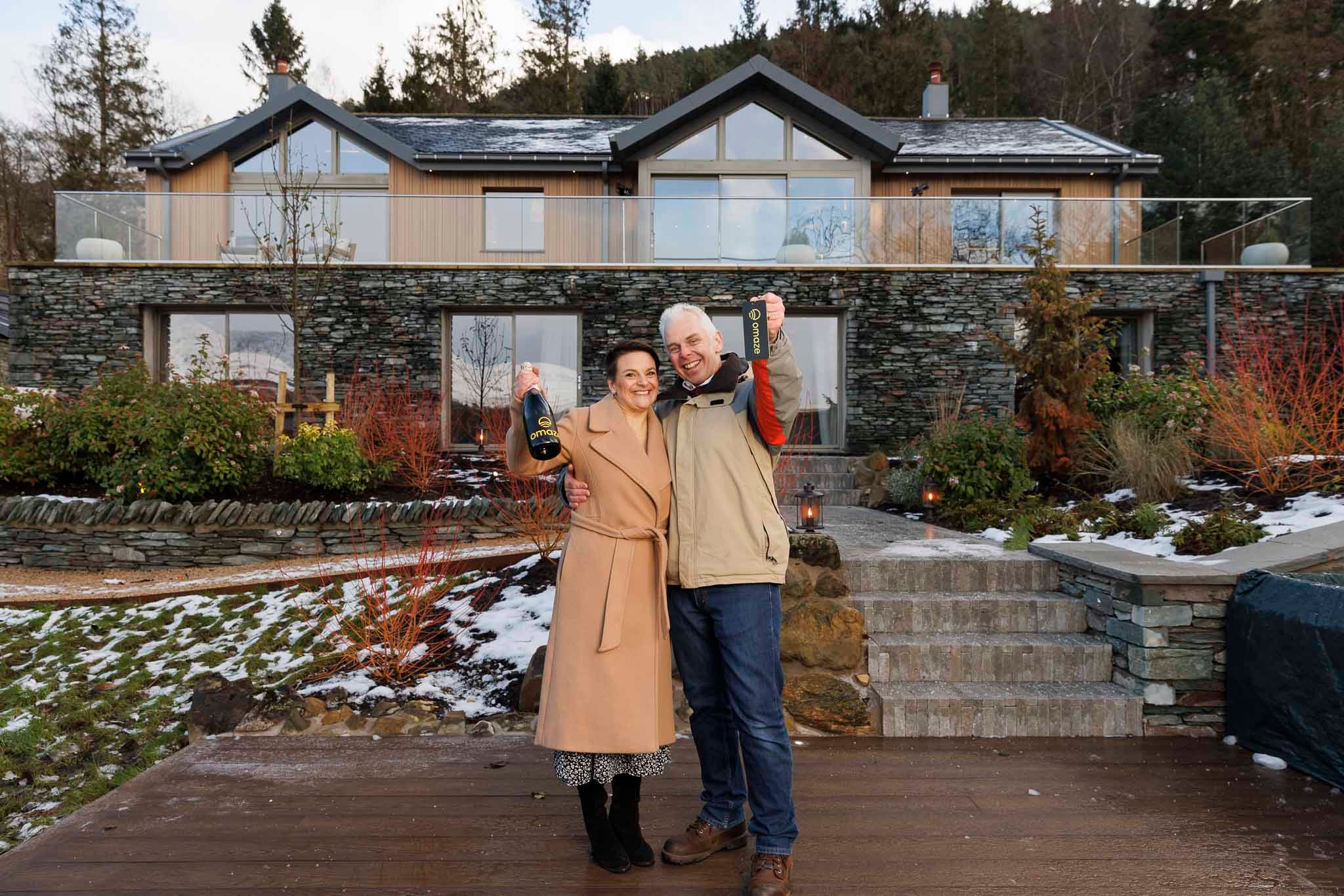
You’ve probably seen the adverts. There’s Olivia Colman, perched on a sofa in a pristine, sun-soaked room, tempting you with the chance of winning a multimillion-pound mansion in Cheshire. Or Eddie Redmayne advertising the raffle for a £4m beachfront house in Sussex (plus £250,000 cash), in between glossy property porn shots of sweeping marble countertops that seamlessly pan to a bubbling hot tub. Or perhaps you’ve spotted that unavoidable blonde and glamorous presenter, trotting around idyllic countryside abodes, telling you it could be all yours. “Go on, what are you waiting for?” they all ask.
This is the improbable yet undeniably enticing marketing behind Omaze. The organisation runs lucrative raffle competitions to win houses across the UK – think glassy Premier League footballer-style homes – and sells the dream of a new life in the process. Entering is simple: there’s a free postal vote, or you can pay £10 for 15 entries, £25 for 40 entries, £150 for 320 entries, or via a tiered monthly subscription plan.
When the draw ends, an extremely chirpy Omaze employee will arrive on the doorstep of the one lucky winner, with a camera crew, a billboard screen parked in the driveway and (prop) keys at the ready. Winners are also given £250,000 in cash to help them settle in – and they can decide to either live in the house, rent it out for a supplementary income, or sell it to become a multimillionaire.
At first glance, I was suspicious. Omaze’s rise to prominence has been marred by allegations of apparently shady conveyance periods and long wait times for move-ins. It was recently reported that Vicky Curtis-Cresswell, a former Miss Wales finalist who won a £6m home in Blakeney, Norfolk, through a Comic Relief raffle in March, was still waiting to move into the property following an apparent planning permission dispute. An Omaze spokesperson said: “Omaze continues to work with North Norfolk District Council in relation to recommendations made regarding the property in Norfolk. Omaze is submitting a retrospective planning application to the council. Omaze reiterates that it guarantees no house winner would ever have to incur any costs whatsoever to remedy any historical planning issue. Omaze further guarantees that all house prizes are transferred to winners with good and marketable title.” At the same time, though, Omaze donates millions to charity each year.
The company was founded in 2012 in Los Angeles by Ryan Cummins and Matthew Pohlson to fundraise through celebrity experience raffle prizes – think singing with Paul McCartney or visiting the set of Star Wars. It then pivoted to house raffles in the UK in 2020. It has raised more than £97m for a range of charities, including the British Heart Foundation, Prince’s Trust and Alzheimer’s Research UK, through 39 competitions. And the business model is extremely clever: one third of ticket prices go to charity, another third to purchasing the prizes, and a final third towards Omaze’s operational costs and the company’s profit. Partnering with Omaze is such a hot ticket in the fundraising sector that charities now bid to work with the company.
The house draws are now entirely ubiquitous; ask around and you’ll realise you know a handful of people who have entered. But the popularity of these competitions paints a depressing picture. One that illustrates that the ultimate prize in modern Britain isn’t winning billions in a National Lottery draw but having a mortgage-free roof over our heads (albeit one with a swishy glass skylight). Omaze’s popularity has risen and risen in tandem with our anxieties about the housing market (blame the perfect storm of rising property prices and a rental market that’s akin to The Hunger Games). For a lot of young people right now, winning a house on the basis of sheer luck might seem more realistic than getting on the property ladder.
Hannah Symes, 31, a mother of five from Plymouth who works in hospitality, is one of the lucky ones. She spent just £30 on a one-off Omaze entry for a million-pound house draw in Bath, and ended up winning one of the offshoot cash prizes: £500,000. She’s speaking to me, surrounded by boxes in a four-bedroom rental property in North Yorkshire, as she prepares to leave for the new home she’s bought with her winnings. She’s also purchased a golden retriever puppy and brand new furniture, and has booked a surprise Legoland trip for her children, happening later this year. None of this – especially owning a home mortgage-free – would have been possible before.
“I never expected to own a house outright,” Symes tells me. “Getting on the property ladder was always going to be a struggle, having five children is not cheap. To afford the right-sized house we needed for the children was never really a possibility. It’s honestly a fairytale, I have to pinch myself to make sure I’m still alive.”

She had entered the raffle after Jo Booth, a winner of the £2.5m Omaze Yorkshire House raffle, had stayed at the hotel where Symes had been working, and encouraged her to enter. “Anybody would think [Omaze] is a scam,” Symes says. “Every single person I meet says it, even when I’ve been a winner, people turn around to me and go, ‘It’s a scam.’” But when Omaze arranged a recorded video call to tell Symes the happy news (the billboard and fake key are reserved for house winners), she couldn’t process the numbers. “I’ve never seen this quantity of money before… my brain just froze,” she says. “I thought my bank would decline it, because it’s never seen that amount of money. But it popped up on my notifications. It still hasn’t sunk in.” Symes says she would encourage anyone to enter Omaze and try their luck.
Henry, a 28-year-old music publicist who has spent £500 on Omaze entries in the past three years, hopes that he is next. He enters the house raffle roughly every six months, spending between £50 to £75 each time. Much of this is motivated by his desire to be a homeowner one day, which doesn’t feel possible in his current financial situation. “Sometimes I think my chances of winning a house through Omaze are better than my chances of ever buying somewhere in London,” he says. “It just feels so out of reach for me to be able to put together the money required for a deposit on the wage I’m currently on, so I just feel like, ‘F*** it, I’ll just drop £100 to win this £4m house – maybe that would just sort it out.”
Lots of the language in Omaze’s marketing videos is about being able to start a “new life” in the prized property. Henry is constantly fantasising about whether one of his entries will pay off. “My mind goes on a crazy train of thought about what this ideal life would be,” he says. If he were successful and won the recently advertised £4m Cheshire house, he already has a plan. He would rent it out to a Premier League footballer for a nice sum of money each month, and move in when he’s ready to leave the city.
This kind of win, to him, is much more stable than scoring, say, a £500m jackpot on the National Lottery’s EuroMillions. “The fact that it’s a house and not just cash as well, it just feels safer to me than a purely monetary prize. Everyone’s heard that story of the Lotto winner who spent it all in the year. Omaze just feels more like I’m buying into a lifestyle rather than a jackpot prize,” he says.
The fact that people are turning to house raffles as an alternative to traditional home ownership is a “sad indictment” of the volatile first-time-buyer market, says Warren Price, a managing director of sales at estate agency Martyn Gerrard based in north London. “We used to sell first-time buyer flats all the time,” says Price. “And that buyer would then trade and buy something bigger in three to five years, on a typical timeframe. But then people started buying flats as investments and becoming landlords, and it stripped a lot of the flat stock away from the market. And in turn, the lack of supply, with demand still there, increased flat prices quite quickly.”
The average age for a first-time buyer in the UK is currently 33 years old, or 36 in London. Price says that people are increasingly disenchanted and despondent about the process of getting on the ladder, or believe it will never be a possibility for them. He says that inflated rent prices have locked people who would otherwise be eligible first-time buyers in a “vicious circle”. “If you’re paying the rent you’re having to pay in London, plus living expenses, young people are not able to save to get on that ladder anyway. And then you can’t leave the city if your job is there,” he explains.
Trying your luck in a raffle, then, doesn’t seem like a bad idea. Omaze isn’t the only company conducting house-winning competitions, either. Another popular company called Raffle House, founded in 2017, operates on a similar business model to Omaze – donating a portion of its profits to charity, as well as giving out weekly prizes worth £1,000 to entrants alongside its “Dream Home Draw”. But what happens when this business model becomes more ubiquitous?

Well, things could get out of control, according to Kelvin Elliott, an expert at the Property Sale Watchdog. He claims that as house raffles become ever more enticing in the current economy, copycats may cotton on to the lucrative Omaze-style business model and open up a new wave of illegitimate companies in the process. “Unfortunately, with anything like this, there is a concern about fly-by-nights trying to jump on the bandwagon and exploit people,” he says. “There will always be people not being as transparent, and it’s a case of how to verify the connection between the charities and the company, and the homes that are being marketed.”
Henry wonders whether house raffles might prompt unhealthy obsessions. This is something he can relate to: when he feels anxious about his finances, he turns to Omaze like it’s a quick fix. “I realised that the amount of money I’ve spent on Omaze in the past three years is easily £400 to £500, and it feels a bit like gambling,” he says. (Omaze is not subject to Gambling Commission regulation due to its prize draws being classified as “free draws” under the Gambling Act 2005). “I’m not saying you’re a bad person if you get involved with gambling, but I don’t think it’s the best thing to be regularly dipping into, especially when you’ve got other things you could be spending your money on that could be more helpful and productive. At least this money is going towards a cause.”
Elliott says that models like Omaze or House Raffles, at present, have a huge level of transparency, but he has concerns about how the buzz around this model may morph into something else. “You can say Omaze is a win-win business model; they’re making money, charities are being paid, and people are winning houses. And it works, so long as things are transparent.” Home ownership, then, has always been like rolling the dice. The stakes have just never been higher.







